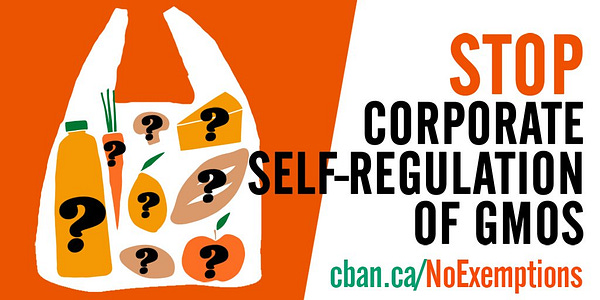My Letter to Health Canada - Say No to GMO Deregulation
New proposed guidance from Health Canada seeks to deregulate certain types of genetic engineering. What do you think?
In response to corporate lobbying from CropLife Canada, Health Canada is proposing new guidelines to deregulate certain types of genetic engineering, including those that are produced with a relatively new technique known as gene editing.
What is Gene Editing?
Gene editing is a relatively new technique for producing GMOs (Genetically Modified Organisms). CRISPR/Cas is a well known example. The process uses enzymes that are targeted to specific locations in the Genome where it cuts the DNA. This triggers the cell’s repair mechanism to mend the break, which can knock out the gene’s function or cause a mutation, creating the “edit.” Researchers must select from multiple edited organisms to find the traits they are looking for. Many types of gene editing are conducted without introducing foreign DNA, leading to false claims that these methods are simply “precision breeding techniques” and do not merit safety concerns. However, many studies have found unintended side effects, including on-target and off-target mutations in the genome, and even the unexpected presence of foreign DNA. Although widely promoted as an efficient, fast, and sustainable alternative to conventional breeding, an investigative report from Greens/EFA in the European Parliament found that gene editing is a risky distraction from real solutions, such as agroecology and organic farming.
While there is growing awareness about the impacts of the industrial food system, big agribusiness is attempting to co-opt the regenerative organic movement by peddling false claims that gene editing is essential to combat climate change and implement a Green New Deal. This type of marketing, employed by Bill Gates and others, must be rejected immediately before it gains any more ground.
To read the proposed new guidance, click here. For a detailed analysis, check out the Update and Overview by CBAN (Canadian Biotechnology Action Network.)
Take action and send an instant letter to the Minister of Health at https://cban.ca/noexemptions/


Below is my letter to Health Canada outlining my concerns. Health Canada is requesting feedback from citizens until May 24th, 2021, specifically in regard to the following questions:
1. “Does the guidance align with the goal of a regulatory approach that is based on the level of food safety risk posed by specific products of plant breeding?” i.e. Would the changes ensure food safety?
2. “Does the voluntary transparency initiative serve its purpose to inform Canadians what non-novel gene-edited products are on the market? Can we do more to achieve this objective?” i.e. Would the changes give you enough information about unregulated GMOs on the market and, if not, how can Health Canada provide more transparency?
You can send your feedback to hc.bmh-bdm.sc@canada.ca
My Letter to Health Canada
Sunday, May 16th, 2021.
To: Health Canada hc.bmh-bdm.sc@canada.ca
and The Hon. Patty Hajdu, Minister of Health
RE: Proposed new guidance for Novel Food Regulations focused on plant breeding
Greetings,
It was recently brought to my attention that Health Canada is proposing new guidance for the regulation of certain genetically engineered foods, "Proposed new guidance for Novel Food Regulations focused on plant breeding." As a Canadian citizen who is concerned about the future of the Canadian food system, I am concerned by many aspects of this draft policy.
Please consider my feedback.
“Does the guidance align with the goal of a regulatory approach that is based on the level of food safety risk posed by specific products of plant breeding?” i.e. Would the changes ensure food safety?
No. First, it effectively allows corporate self-regulation by removing regulatory impediments for gene edited plants. The new guidelines would also weaken safety assessments for GMOs that are similar to those previously approved by Health Canada. The claim is that the proposal merely exempts “plants with genetic modifications that are not the result of the insertion of foreign DNA.” This is a misleading statement, implying that genome editing methods - such as the CRISPR/Cas system of gene modification - are somehow different than older transgenic GMOs and do not merit safety concerns. It ignores many studies that have found unintentional on-target and off-target mutations in the genome of gene edited organisms. Technically and legally, gene editing is genetic engineering. I am already disappointed with Health Canada's approval process, which is not transparent, and appears to be compromised by industry influence. These new proposals give responsibility for safety to the corporations whose profit depends on bringing their products to market. It has been demonstrated that allowing industry to determine safety is a failed approach. These new guidelines seem designed in response to lobbyists, not citizens and consumers.
“Does the voluntary transparency initiative serve its purpose to inform Canadians what non-novel gene-edited products are on the market? Can we do more to achieve this objective?” i.e. Would the changes give you enough information about unregulated GMOs on the market and, if not, how can Health Canada provide more transparency?
The use of the word "transparency" here is misleading. The policy Health Canada is proposing states that companies are to “voluntarily” report when they intend to commercialize a non-regulated GMO product. I like to be aware of what food I am eating, and this does not convince me that a comprehensive list of all products is possible. Since companies are merely “encouraged” to inform Health Canada about new GM foods, these guidelines could allow them to commercialize new GMOs without notifying Canadians. Please propose mandatory transparency.
In conclusion, I believe that regulators are responsible for protecting the health of citizens, not corporations. GM technology often leads to surprise side-effects, for health and the environment. I ask that Health Canada conduct mandatory safety assessments - independent from industry funding and conflicts of interest - for all new genetically engineered products. Further, I request that more thought is given to the necessity of GMOs in agriculture, considering the need for a transition to sustainable farming practices. Despite industry claims that GM is a sustainable solution to the climate crisis, it enables monopoly control of the food system and increases herbicide use that pollutes our ecosystems. Also the patenting of seeds, which seems to be the primary goal of GMO technology, raises questions about bioethics and whether life should be treated as a commodity and intellectual property. I would like to see a ban on genetic engineering, as I believe that small, regenerative farms are the solution. We need to embrace nature-based solutions that harness all of the earth’s intelligence to create true sustainability and ecological harmony.
Leadership is needed to create policy that represents the health of Canadians - I look forward to your response.
Thank you,
Aidan Paul Randall





